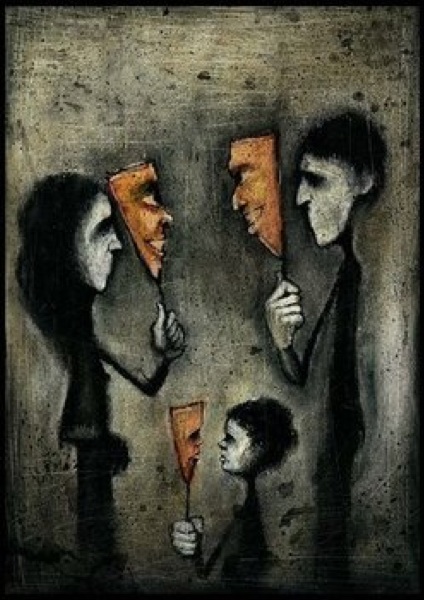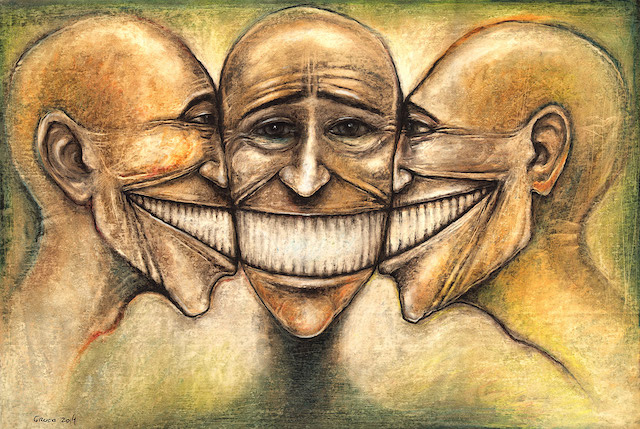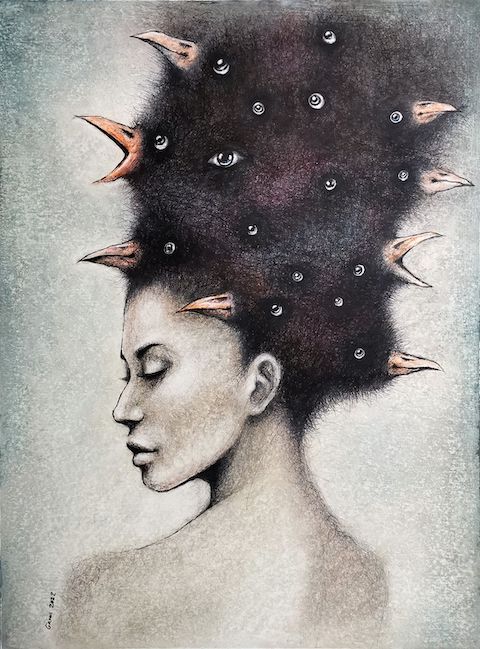
Painting in oil pastels, “Family Portrait”, by the Polish graphic artist Sławek Gruca.
Almost anybody can learn to think or believe or know, but not a single human being can be taught to feel. Why? Because whenever you think or you believe or you know, you’re a lot of other people: but the moment you feel, you’re nobody-but-yourself.
To be nobody-but-yourself — in a world which is doing its best, night and day, to make you everybody else — means to fight the hardest battle which any human being can fight; and never stop fighting.
– ee cummings
Rhyd Wildermuth has a new essay about the importance of learning who we really are, and then being authentically ourselves. He quotes poet John O’Donohue as saying “Most people are afraid of being themselves”, so we live instead through personas that are more acceptable to those around us and those we care about.
Rhyd’s view is that “we imagine things are going to be much, much worse when we act true to ourselves than they ever really are”.
I’ve written of late about the near-impossibility of knowing what our unique gifts and our greatest passions are, because we are streamed throughout our lives in ways that narrow our exposure to the world and its possibilities, and hence to our own possibilities. I’ve also come to believe we are completely conditioned in our behaviours, and hence have no free will whatsoever. And of course I’ve also written ad nauseam about the possibility there is no ‘us’ and the sense we have of self and separation is completely illusory.
Where is the ‘space’ for being one’s ‘authentic self’, given such ghastly constraints?
Brené Brown has explained how, when out of fear of loss, we lose our tolerance for vulnerability, we become numb, we try to inure ourselves to pain and hence at the same time inure ourselves to joy. In the process we lose connection to ourselves, she argues, and we become ‘somebody else’, someone cowed and oppressed by fear. But whether or not we can overcome that intolerance and fearfulness is, I would argue, also a matter of our conditioning, which is not in the least a matter of our choice or within our control.
Radical non-duality throws us a clue about who we ‘really’ are, beyond the mask of self. Those who have ‘lost’ their sense of self and separation, and ‘see’ that there is really no one, just appearances, report that there are ‘still’ characters, apparent bodies apparently behaving in certain ways, having certain apparent preferences. But these apparent preferences, they say, appear to be purely conditioned by the body’s biology and the enculturation of other apparent characters. There is no volition, no agency, no individuality or originality in any of it, beyond the ‘uniqueness’ of each character’s conditioning. It’s just like actors, reading pre-written scripts, on cue, that play off each other’s lines.
Without conditioning by “the world” trying to make us “everybody else”, perhaps we would just be more conditioned by our biology and genetics and less conditioned by our culture. What’s the difference, really?
And why should human creatures have evolved to be anything other than the sum of our conditioning? Wild creatures do not have to “self-inquire” and work and fight hard and think critically in order to be exactly who they are; and they are no less or more conditioned than we are.
My brief study of Ikigai told me some things about myself — what I care about, delight in, where I feel I belong and what captures my attention, but these things are all the results of my conditioning. The fact that the list has changed a lot, especially recently, reflects what has shaped my conditioning in the last few years, and the things (ideas, places, activities etc) I was already inclined to nod ‘yes’ to before I’d even encountered them. I had no agency in it.
I used to believe that ‘being yourself’ was an unlearning process, getting rid of all the gunk that gets attached to us before we ‘learn to think for ourselves’. But this is fanciful, self-aggrandizing, heroic talk. I’ve shaken off ideas and behaviours not out of personal volition, but because where I have been, and who I have been with, and what I have done, predisposed me to do so. As much as I hate to admit it, I’ve probably taken on just as much new ‘gunk’ as I’ve gotten rid of; the new stuff is just shinier and more appealing to me, due to my conditioning in the interim.
As Nietzsche said, to some extent we “become who we are” through contrast with others’ interpretation and understanding of things. But the evolution of our selves through how our thoughts and ideas contrast with others’ is, I think, just a subtler form of conditioning.
We now live in a society that is increasingly obsessed with ‘identity’. I find this utterly annoying, and when I’m asked any question that starts “Do you identify…”, my answer is always (since there’s invariably a list to choose from) — None of the above. The answer to who we are will not be found, IMO, in labels, which are just boxes that limit and imprison us. How is asking others to define us with ‘identity’ labels of our own ‘choosing’ any better or any more meaningful than whatever (mostly unspoken) labels they will inevitably apply to us anyway? Who are we trying to kid? And who are we trying to convince?
I’m laughing as I write this. This character has apparently been conditioned to get enormous enjoyment from exploring puzzles that have no solution. And this — the search to be ‘our true selves’ — is a really terrible rabbit hole. There is no escape.
A couple more works by Sławek Gruca to think about (though the one above remains my favourite of his):
“Land of Happiness” (perhaps a reflection on the challenges of trying to be yourself?):

and, below, “Cosmic Thoughts” (my read: are our thoughts really our own, or do they just arise and we claim ownership and try to make sense of them?):

In addition to his website where you can buy his original works, and his DeviantArt page, which sells prints, Sławek also has a Facebook page with his most recent works.
Even Nietzsche understood that art is the most important work we can do, the closest we can hope to get to the ‘real’ truth.





The central question of Charles Taylor’s “Ethics of Authenticity” is whether or not it’s possible to engage in reason with people who believe being true to one’s “authentic self” is the correct, or even a coherent, choice. He concludes that the answer is “yes” but not because he can make the case that it is but because the trouble we are in would be overwhelming if the answer were “no.”